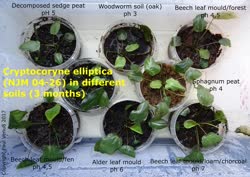|
|||||
The beech litter has a mould that fixes nitrogen from the air.
Because Crypts grew in areas with poor nitrate they don't absorb it very efficiently. With the bacteria/mould they can live in areas of no nitrate.
Now, the same thing with manure under sand, and put some washed steel will with the manure as well.
This has so much nitrogen and iron even inefficient Crypts grow well in my experience.
Iron as rust cannot be used by plants. But in an anaerobic environment is reduced to a form that is bioavailable.
We should also consider the possibility there may be iron fixing bacteria at play here as well as nitrogen fixing ones. In fact there is already evidence of this.
If you see what looks like rust on roots, which you can see here, or if you see rust in the shower or other bathroom fixtures, that's not iron precipitating out, that's iron deposited by iron fixing bacteria.
So, the bacteria fixes iron onto the plant. Again, under anearobic conditions iron is reduced to the bioavailable ferrous state and this these bacteria may be part of an iron transport system that favors Cryptocoryne because of their rhizome networks which can function as "iron antennas".

